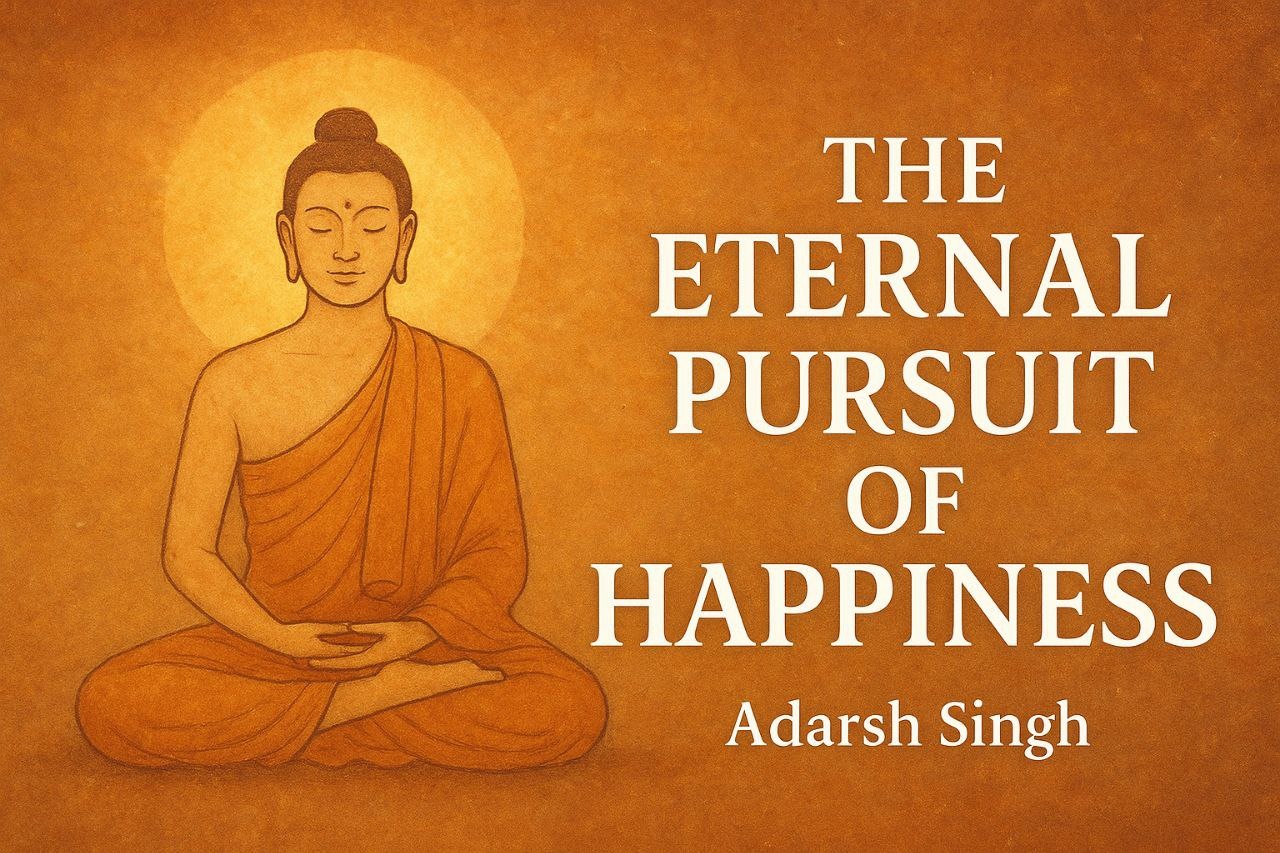The Eternal Pursuit of Happiness: From Desire to Inner Bliss

Human life, in its essence, is a ceaseless journey in search of happiness. Every action, whether great or small, every goal, whether noble or ordinary, is ultimately driven by this subtle yet powerful longing for happiness. The names of our pursuits may differ, wealth, status, relationships, knowledge, or power, but in the depths of the human heart lies one constant: the desire for happiness.
At a superficial level, it appears as though human beings seek many things. Yet, if one observes carefully, all these pursuits are but variations of a single fundamental quest, the quest for joy, peace, and fulfillment.
“Every pursuit of man, however different in appearance, is a veiled attempt to touch happiness.” ~ Adarsh Singh
The Nature of Happiness
Happiness in the material sense is fleeting. Wealth may bring temporary comfort, relationships may give moments of joy, achievements may spark pride, yet none of these last forever. External happiness is like a mirage, it shines brightly from afar, but fades upon reaching it, leaving behind a thirst for more.
This restless chase reveals a profound truth: happiness sourced outside cannot be permanent, because the external world itself is ever-changing. True happiness must therefore be rooted in something unchanging, eternal, and stable.
Indian Philosophy and the Pursuit of Happiness
Indian philosophy has deeply reflected upon this central question of life, What is true happiness, and where can it be found?
Vedas and Upanishads affirm that the ultimate reality, Brahman, is Ananda, pure bliss. The Upanishadic declaration “Anando Brahmeti vyajānāt” (Brahman is bliss) reveals that joy is not outside us but the very essence of our being.
Sankhya Philosophy explains that suffering arises from ignorance, mistaking the eternal Purusha (self) for the transient Prakriti (matter). Liberation from this error is liberation into pure happiness.
Yoga Philosophy teaches that when the restless mind is stilled, the self rests in its true nature, and there lies bliss.
“Yogash chitta-vritti-nirodhah”, Yoga is the stilling of the fluctuations of the mind.
Vedanta proclaims that the individual self is not separate but one with Brahman, the infinite. Realizing this oneness brings unshakable bliss. As Adi Shankaracharya declared, “Brahma satyam, jagan mithyā, jīvo brahmaiva nāparah.”
Buddhism points out that craving (tṛṣṇā) is the root of suffering. The cessation of craving leads to Nirvana, which is not mere extinction but supreme peace.
Jainism reminds us that the soul is inherently pure, blissful, and radiant. Through discipline and freedom from karmic bondage, the soul shines in its own natural joy.
Thus, Indian wisdom converges on one truth:
External pleasures are impermanent, while true happiness lies in self-realization, discipline, and inner awakening.
“Indian philosophy whispers an eternal reminder: happiness is not something to be found, it is something to be uncovered within.” ~ Adarsh Singh
Happiness in the Spiritual Sense
The spiritual journey takes this understanding further. What we call “happiness” in the worldly sense is only a shadow of the supreme bliss, Ananda. The Upanishads describe this as the joy of the soul resting in its own self.
The Bhagavad Gita says:
“Yatra paramate chittam niruddham yoga-sevayā, yatra chāivātmanātmānam paśyann ātmani tuṣyati.”
When the mind is controlled through yoga, the self beholds the Self within, and there it rejoices.
Here, happiness is no longer dependent on external factors; it is the natural fragrance of the awakened self. Meditation, self-inquiry, and devotion lead the seeker to this state of bliss where joy is constant and independent of circumstances.
Relevance in the Modern World
In today’s fast-paced, consumer-driven society, the lessons of Indian philosophy are more relevant than ever. Despite technological progress, luxury, and comfort, modern humans are plagued with stress, anxiety, and dissatisfaction. This is because happiness is still being sought outside, through possessions, recognition, and endless desires.
Materialism vs. Spirituality
Today’s obsession with accumulation creates restlessness. Indian wisdom reminds us that contentment arises not from having more, but from realizing enough.
Yoga and Meditation
Once seen as spiritual disciplines, they are now globally recognized as powerful tools for mental health, stress relief, and inner peace.
Desire and Dissatisfaction
As the Buddha said, craving breeds suffering. Our consumerist culture thrives on unending desires, yet true happiness is born from moderation and simplicity.
Self-Knowledge
Vedanta emphasizes that man is not a beggar of joy but the very source of it. Recognizing this shifts life from restlessness to peace.
Balanced Living
The Bhagavad Gita’s teaching of detached action offers the perfect model, engage fully in life, but anchor the mind in higher truth.
“Modern life is not short of comforts, but short of inner stillness. The wisdom of our tradition teaches us that happiness is not a destination reached outside, but an awakening within.” ~ Adarsh Singh
The Final Truth of Happiness
The human longing for happiness is not a weakness, but a divine compass. It is life’s way of guiding us from the transient to the eternal, from the outer to the inner, from fleeting pleasures to lasting bliss. The pursuit of happiness, when misunderstood, leads to restlessness. When understood rightly, it becomes the very path to self-realization.
Happiness is not to be manufactured, earned, or acquired, it is to be realized. It is the essence of who we are.
“The search for happiness is not a journey outward but a homecoming inward. When man awakens to his own essence, he realizes that he himself is the bliss he was always seeking.” ~ Adarsh Singh
Thu Sep 4, 2025
